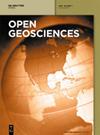Hunger Games Search for the elucidation of gravity anomalies with application to geothermal energy investigations and volcanic activity studies
IF 1.7
4区 地球科学
Q3 GEOSCIENCES, MULTIDISCIPLINARY
引用次数: 0
Abstract
Recent metaheuristic approaches are extensively and intensively being implemented to the interpretation of gravity anomalies due to their superior advantages. We emphasize the application of Hunger Games Search (HGS), a newly established metaheuristic inspired by hunger-driven instincts and behavioral choices of animals, to elucidate gravity data for geothermal energy exploration and volcanic activity study. After recognizing the modal features of the objective function tailored and tuning the algorithm control parameters involved, HGS has been trial-tested on simulated data sets of different scenarios and finally experienced in two field cases from India and Japan. Notably, a second moving average strategy has been successfully integrated into the objective function to eradicate the regional component from observed responses. Post-inversion uncertainty appraisal tests have been further implemented to comprehend the reliability of solutions obtained. The solutions retrieved by HGS have been unbiasedly compared in terms of convergence rate, accuracy, stability, and robustness with the solutions of the commonly used particle swarm optimization algorithm. Based on the results accessed, the theoretical and field cases presented could be recuperated more precisely, stably, robustly, and coherently with the available geophysical, geological, and borehole verification, as HGS is able to better explore the model space without compromising its capability to efficiently approach the global minimum. This novel global optimization method can thus be considered as a promising tool in geothermal energy investigations and the study of volcanic activities.饥饿游戏 搜索重力异常现象,并将其应用于地热能源调查和火山活动研究
最近的元启发式方法因其卓越的优势被广泛深入地应用于重力异常的解释。我们重点介绍饥饿游戏搜索(HGS)的应用,这是一种新建立的元启发式方法,其灵感来源于饥饿驱动的动物本能和行为选择,用于地热能源勘探和火山活动研究的重力数据阐释。在识别了量身定制的目标函数的模态特征并调整了相关算法控制参数后,HGS 在不同场景的模拟数据集上进行了试验,并最终在印度和日本的两个实地案例中得到了验证。值得注意的是,在目标函数中成功集成了第二个移动平均策略,以消除观测响应中的区域成分。还进一步实施了转换后不确定性评估测试,以了解所获解决方案的可靠性。在收敛速度、准确性、稳定性和鲁棒性方面,HGS 与常用的粒子群优化算法的解决方案进行了无偏比较。根据所获得的结果,由于 HGS 能够更好地探索模型空间,同时又不影响其有效接近全局最小值的能力,因此可以更精确、稳定、稳健地恢复所提出的理论和现场案例,并与现有的地球物理、地质和钻孔验证保持一致。因此,这种新颖的全局优化方法可被视为地热能源调查和火山活动研究中的一种有前途的工具。
本文章由计算机程序翻译,如有差异,请以英文原文为准。
求助全文
约1分钟内获得全文
求助全文
来源期刊

Open Geosciences
GEOSCIENCES, MULTIDISCIPLINARY-
CiteScore
3.10
自引率
10.00%
发文量
63
审稿时长
15 weeks
期刊介绍:
Open Geosciences (formerly Central European Journal of Geosciences - CEJG) is an open access, peer-reviewed journal publishing original research results from all fields of Earth Sciences such as: Atmospheric Sciences, Geology, Geophysics, Geography, Oceanography and Hydrology, Glaciology, Speleology, Volcanology, Soil Science, Palaeoecology, Geotourism, Geoinformatics, Geostatistics.
 求助内容:
求助内容: 应助结果提醒方式:
应助结果提醒方式:


